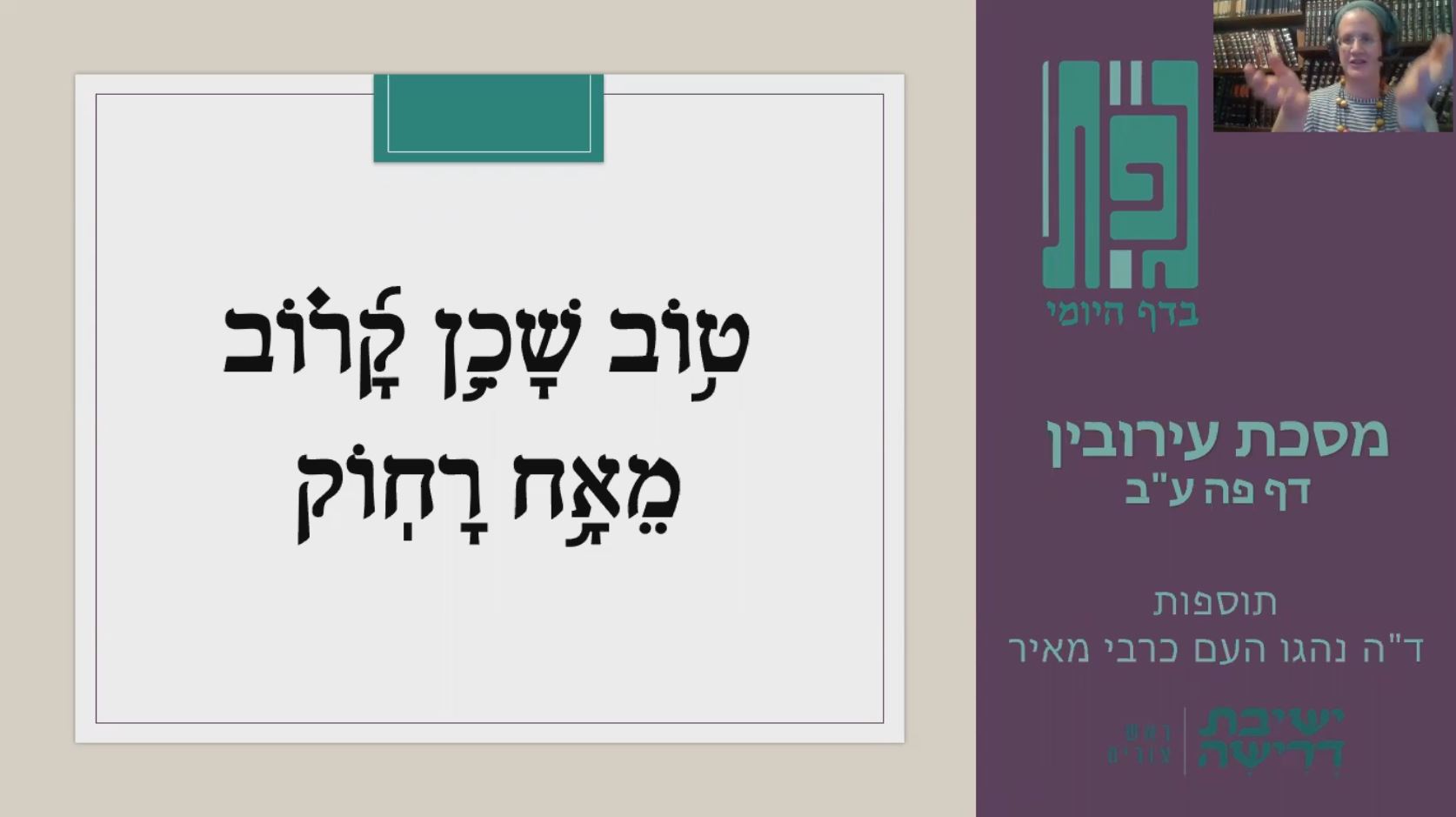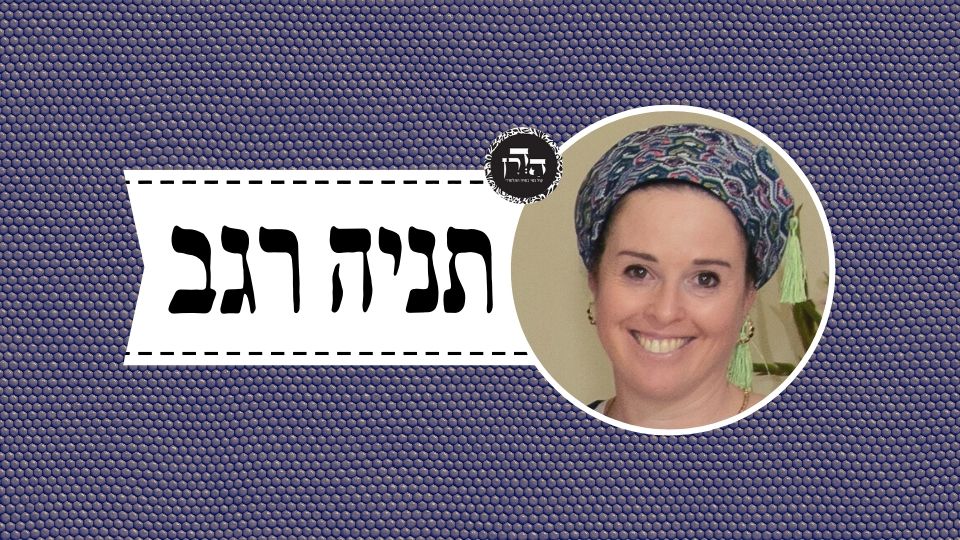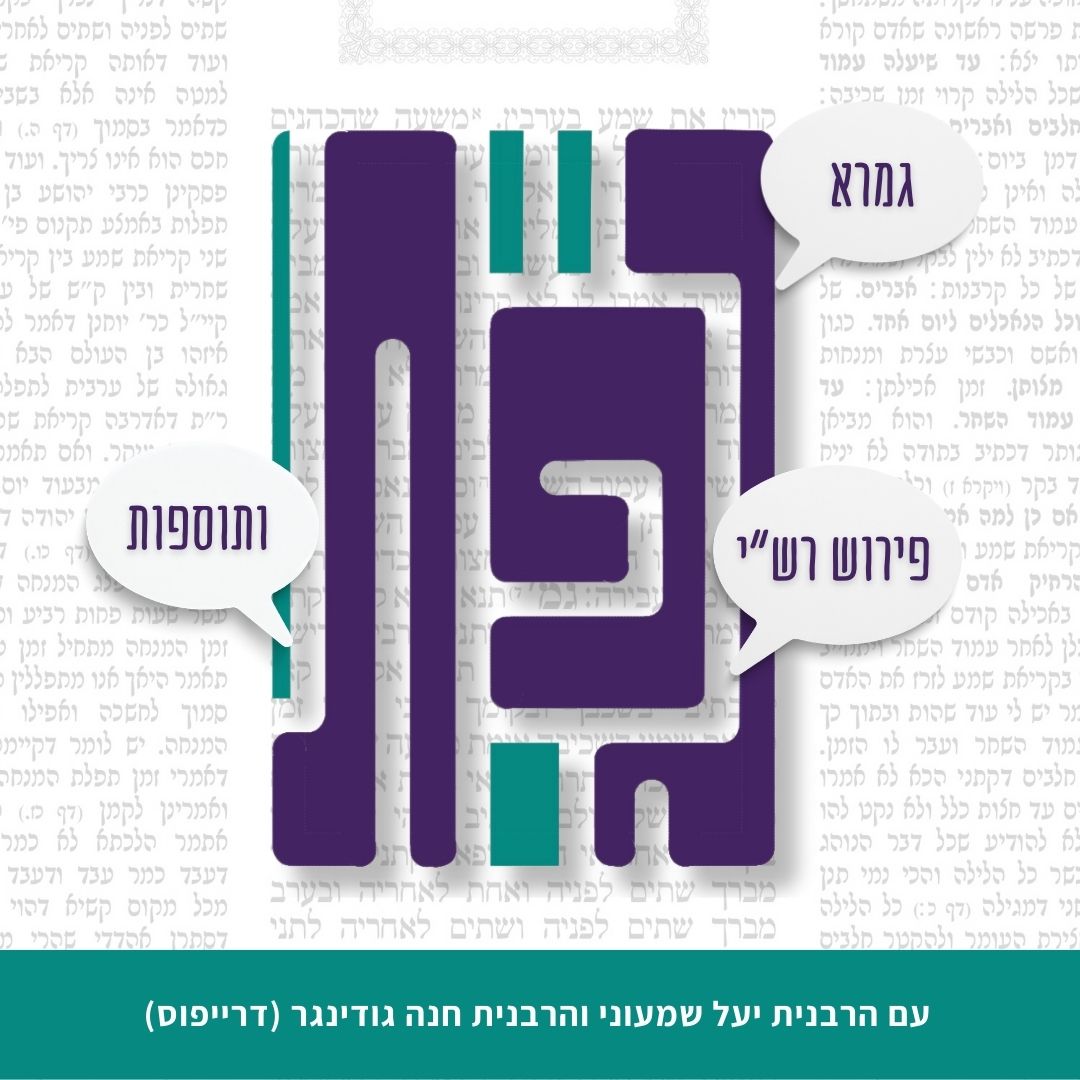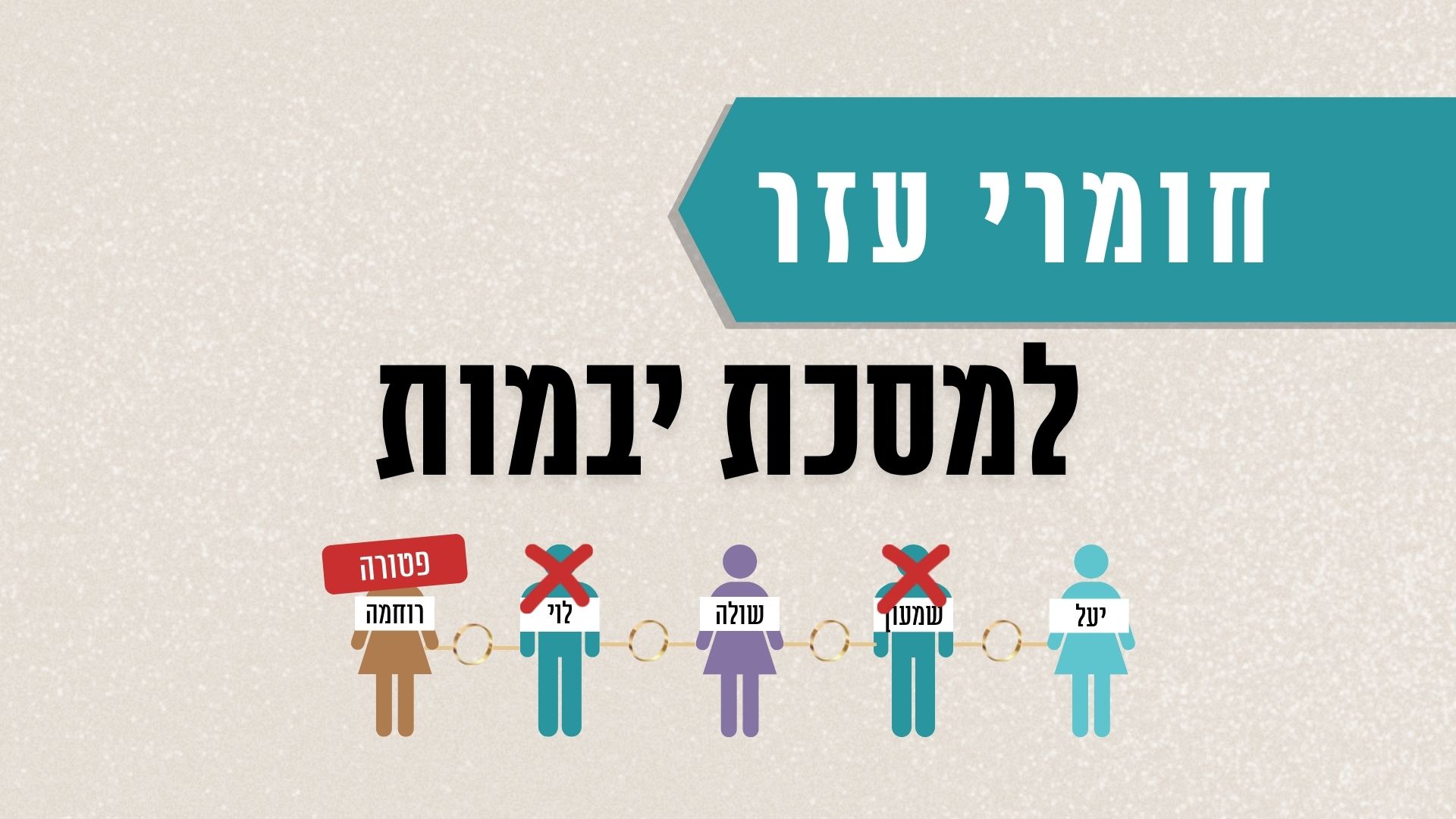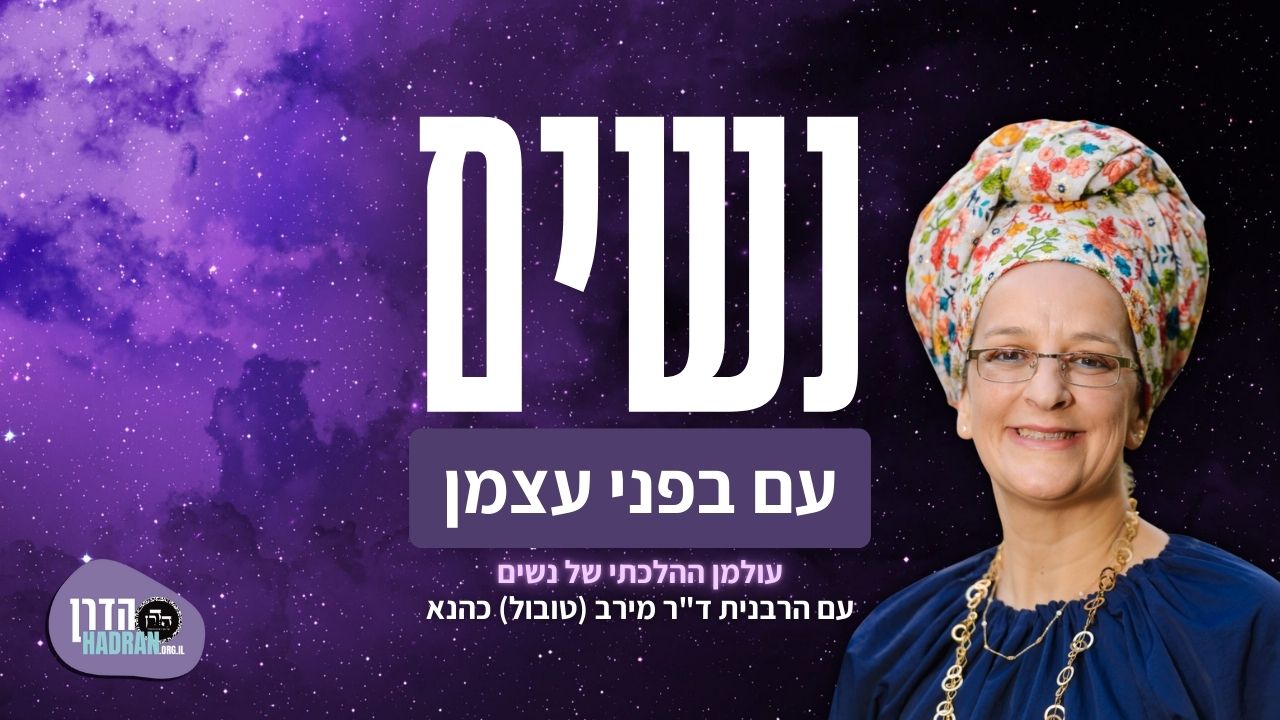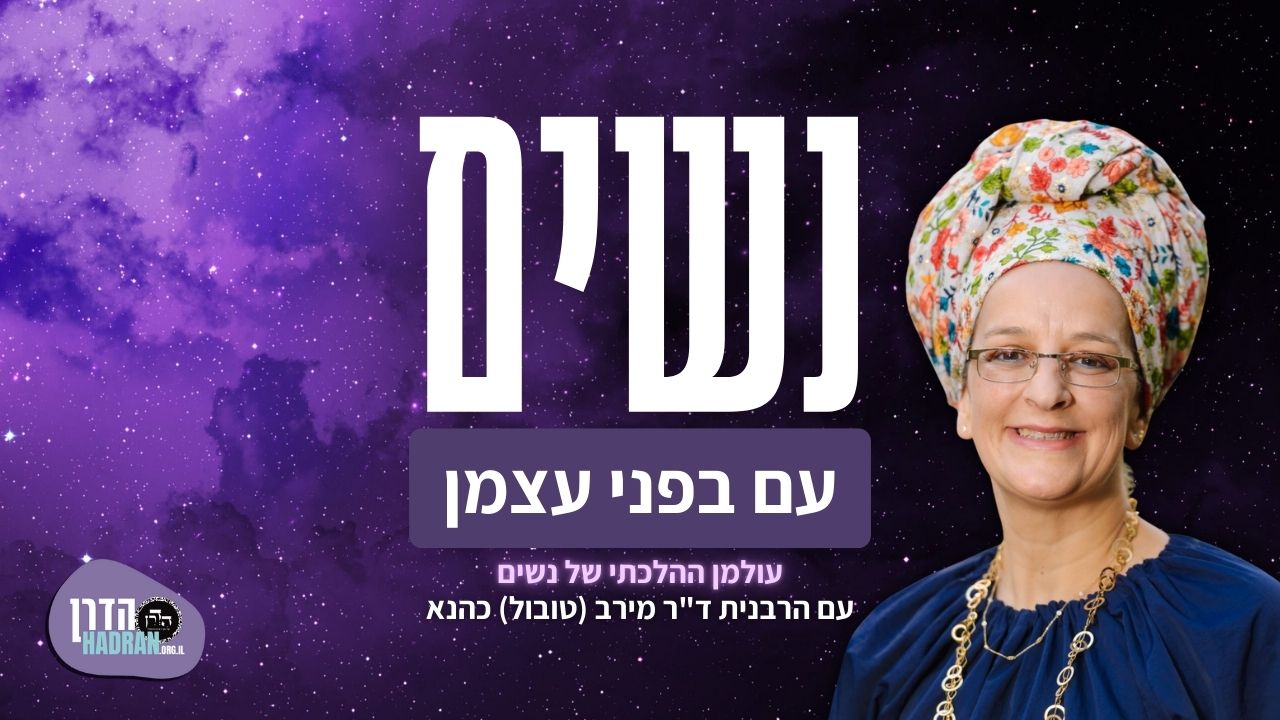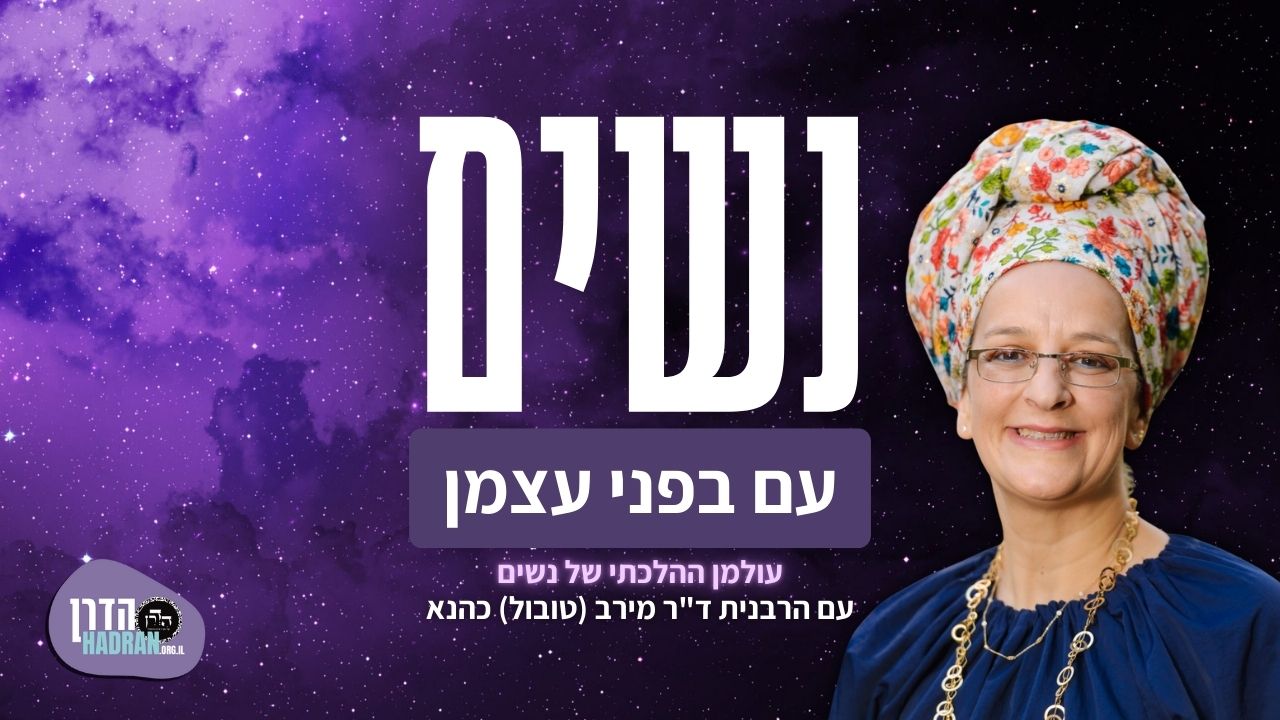מניין אפשר לדרוש מהפסוקים שמעשר בהמה אינו ניתן לפדיון ואינו ניתן למכירה כשבכור בהמה טמאה לא ניתן לפדיון אבל כן ניתן למכירה?
הלימוד השבוע מוקדש לזכות ולשלום הַיְימׇנוֹט אֱמוּנָה בַּת באנצ’י (קָסָאוּ) בת 11 שנעלמה במקום מגוריה בצפת, לפני שנתיים, ביום ט”ז אדר תשפ”ד (25.2.24), ולא נודעו עקבותיה.
הלימוד השבוע מוקדש למען ביטחון המדינה, החיילים והאזרחים, ולמען חירותו של העם האיראני. שנזכה בקרוב שיתקיים בנו הפסוק: "לַיְּהוּדִים הָיְתָה אוֹרָה וְשִׂמְחָה וְשָׂשֹׂן וִיקָר”.
הלימוד השבוע מוקדש לזכות וְלִשְׁלוֹם הָיימָנוֹט אֱמוּנָה בַּת באנצ’י (קָסָאוּ), בת 11 שנעלמה במקום מגוריה בצפת, לפני שנתיים, ביום ט”ז אדר תשפ״ד (25.2.24), ולא נודעו עקבותיה. אנו מתפללים שֶׁתִּמָּצֵא וְתוּשַׁב לביתה במהרה!
רוצה להקדיש שיעור?

כלים
הלימוד השבוע מוקדש לזכות ולשלום הַיְימׇנוֹט אֱמוּנָה בַּת באנצ’י (קָסָאוּ) בת 11 שנעלמה במקום מגוריה בצפת, לפני שנתיים, ביום ט”ז אדר תשפ”ד (25.2.24), ולא נודעו עקבותיה.
הלימוד השבוע מוקדש למען ביטחון המדינה, החיילים והאזרחים, ולמען חירותו של העם האיראני. שנזכה בקרוב שיתקיים בנו הפסוק: "לַיְּהוּדִים הָיְתָה אוֹרָה וְשִׂמְחָה וְשָׂשֹׂן וִיקָר”.
הלימוד השבוע מוקדש לזכות וְלִשְׁלוֹם הָיימָנוֹט אֱמוּנָה בַּת באנצ’י (קָסָאוּ), בת 11 שנעלמה במקום מגוריה בצפת, לפני שנתיים, ביום ט”ז אדר תשפ״ד (25.2.24), ולא נודעו עקבותיה. אנו מתפללים שֶׁתִּמָּצֵא וְתוּשַׁב לביתה במהרה!
כלים
העמקה
רוצה להבין מה באמת קורה מתחת לפני השטח של הסוגיה?
שיעורים, פודקאסטים והרחבות של מיטב המורות שלנו יפתחו לך עוד זוויות וכיווני חשיבה.
חדשה בלימוד הגמרא?
זה הדף הראשון שלך? איזו התרגשות עצומה! יש לנו בדיוק את התכנים והכלים שיעזרו לך לעשות את הצעדים הראשונים ללמידה בקצב וברמה שלך, כך תוכלי להרגיש בנוח גם בתוך הסוגיות המורכבות ומאתגרות.
פסיפס הלומדות שלנו
גלי את קהילת הלומדות שלנו, מגוון נשים, רקעים וסיפורים. כולן חלק מתנועה ומסע מרגש ועוצמתי.
בכורות לב
דָּבָר שֶׁאֵינוֹ נִישּׁוֹם מֵחַיִּים — לָא גְּזוּר רַבָּנַן, וּבְיַתְמֵי אוֹקְמוּהָ רַבָּנַן אַדְּאוֹרָיְיתָא.
But with regard to an item that is not appraised when an animal is sold when alive, e.g., the hide and sinews, as these are not primary contributing factors to the animal’s value, the Sages did not decree that one may not sell such items after the animal’s slaughter. Consequently, the meat of an animal tithe offering may be sold by means of inclusion in the animal’s hide, fat, sinews, and horns. And with regard to a case of young orphans, the Sages established the halakha as if by Torah law, and therefore the meat may be sold in its usual manner.
וְאַף רַב שְׁמוּאֵל בַּר רַב יִצְחָק סָבַר לַהּ לְהָא דְּרָבָא, דְּאָמַר רַב שְׁמוּאֵל בַּר רַב יִצְחָק: מִנַּיִן לְמַעְשַׂר בְּהֵמָה שֶׁל יְתוֹמִים שֶׁמּוֹכְרִים אוֹתוֹ כְּדַרְכּוֹ?
The Gemara notes: And even Rav Shmuel bar Rav Yitzḥak holds in accordance with that opinion of Rava, that by Torah law, the meat of a blemished animal-tithe offering may be sold in the normal manner. As Rav Shmuel bar Rav Yitzḥak says: From where is it derived that one may sell the meat of a blemished animal-tithe offering of young orphans in its usual manner, without having to resort to the method of inclusion?
שֶׁנֶּאֱמַר: ״רַק בְּכׇל אַוַּת נַפְשְׁךָ תִּזְבַּח וְאָכַלְתָּ בָשָׂר״, אֵיזֶהוּ דָּבָר שֶׁאֵין בּוֹ בְּרָכָה מֵחַיִּים אֶלָּא לְאַחַר שְׁחִיטָה? הֱוֵי אוֹמֵר: זֶה מַעְשַׂר בְּהֵמָה.
It is derived from a verse, as it is stated in a verse discussing consecrated animals that became blemished: “Notwithstanding, after all the desire of your soul, you may slaughter and eat flesh, according to the blessing of the Lord your God” (Deuteronomy 12:15). Now which is the item that has no blessing when it is alive, i.e., it is prohibited to derive benefit from it, but it does have a blessing after its slaughter, as indicated by the verse “You may slaughter…according to the blessing of the Lord your God”? You must say that this is the meat of the animal tithe offering.
אִיבַּעְיָא לְהוּ: מַהוּ לְהַבְלִיעוֹ בַּעֲצָמוֹת? רַבִּי חִיָּיא וְרַבִּי שִׁמְעוֹן בְּרַבִּי, חַד אָמַר: מַבְלִיעוֹ, וְחַד אָמַר: אֵין מַבְלִיעוֹ.
§ The baraita cited earlier teaches that the Sages permitted the inclusion of the value of a blemished animal-tithe offering’s meat in the cost of its hide, fat, sinews, and horns. In this regard, a dilemma was raised before the Sages: What is the halakha with regard to including the value of the meat in the cost of the animal’s bones? Rabbi Ḥiyya and Rabbi Shimon, son of Rabbi Yehuda HaNasi, disputed this matter. One says that one may include the value in the cost of the bones, and one says one may not include it.
וְלָא פְּלִיגִי — הָא בְּדַקָּה, הָא בְּגַסָּה.
The Gemara notes: And they do not disagree. This one, who maintains that one may not include the value in the cost of the bones, is referring to a small, domesticated animal, whose bones are incapable of being fashioned into utensils and are therefore never sold. That one, who holds that one may include the value in the cost of the bones, is referring to a large, domesticated animal, whose bones can be used and are therefore sold.
וְאִיבָּעֵית אֵימָא: אִידֵּי וְאִידֵּי בְּגַסָּה, וְלָא פְּלִיגִי — מָר כִּי אַתְרֵיהּ, וּמָר כִּי אַתְרֵיהּ.
And if you wish, say instead that both this one and that one are referring even to a large, domesticated animal, and still they do not disagree. This Sage rules in accordance with the custom of his locale, and that Sage rules in accordance with the custom of his locale. In other words, in certain places the custom is to use the bones and sell them, while elsewhere they do not.
גּוּפָא: בִּבְכוֹר הוּא אוֹמֵר: ״לֹא יִפְדֶּה״, וְנִמְכָּר; בְּמַעֲשֵׂר נֶאֱמַר: ״לֹא יִגָּאֵל״, וְאֵינוֹ נִמְכָּר, לֹא חַי וְלֹא שָׁחוּט, וְלֹא תָּם וְלֹא בַּעַל מוּם. מְנָא הָנֵי מִילֵּי?
§ The Gemara returns to the matter itself, stated in the baraita: With regard to a firstborn male animal offering the verse states: “You shall not redeem” (Numbers 18:17), but it may be sold while alive, by the priest to whom it belongs. By contrast, with regard to the animal tithe offering, it is stated: “It shall not be redeemed” (Leviticus 27:33), indicating that its sanctity can never be removed from it, and it cannot be sold, not when alive and not when slaughtered, not when unblemished and not when blemished. The Gemara asks: From where is this matter derived, that the phrase “it shall not be redeemed” is referring to the prohibition against selling the animal tithe offering?
אָמַר רַב חִינָּנָא אָמַר רַב, וְכֵן אָמַר רַב דִּימִי אָמַר רַבִּי יוֹחָנָן: נֶאֱמַר ״לֹא יִגָּאֵל״ בְּמַעֲשֵׂר, וְנֶאֱמַר ״וְלֹא יִגָּאֵל״ בַּחֲרָמִים, מָה לְהַלָּן מְכִירָה עִמּוֹ, אַף כָּאן מְכִירָה עִמּוֹ.
Rav Ḥinnana says that Rav says, and similarly, Rav Dimi says that Rabbi Yoḥanan says: It is stated: “It shall not be redeemed,” with regard to the animal tithe offering, and it is stated: “And it shall not be redeemed,” with regard to dedications [baḥaramim], i.e., property that one consecrated by means of the expression: Ḥerem. With regard to dedications, the verse states: “Notwithstanding, any dedicated item…may neither be sold nor redeemed” (Leviticus 27:28). This is a verbal analogy: Just as there, with regard to dedications, the prohibition against selling is mentioned together with the prohibition against redeeming, so too here, with regard to the animal tithe offering, the prohibition against selling is mentioned together with the prohibition against redeeming.
אֲמַר לֵיהּ רַב נַחְמָן בַּר יִצְחָק לְרַב הוּנָא בְּרֵיהּ דְּרַב יְהוֹשֻׁעַ: מַפְנֵי, דְּאִי לָא מַפְנֵי, אִיכָּא לְמִפְרַךְ: מָה לַחֲרָמִים, שֶׁכֵּן חָלִים עַל הַכֹּל!
Rav Naḥman bar Yitzḥak said to Rav Huna, son of Rav Yehoshua: It must be that at least one of the phrases “It shall not be redeemed” is free, i.e., at least one of these terms is superfluous in its context, which means that it is included for the specific purpose of the verbal analogy. In such a case the verbal analogy cannot be refuted by logic, whereas if neither phrase is free one can refute the analogy if there is a significant difference between the two cases. As, if these terms are not free, the verbal analogy can be refuted: What is notable about dedications, in contrast to the animal tithe offering? They are notable in that they apply to all items one wishes to dedicate, whereas an animal tithe offering applies only to kosher animals.
לָאיֵי אַפְנוֹיֵי מַפְנֵי, לֹא יֵאָמֵר ״וְלֹא יִגָּאֵל״ בַּחֲרָמִים, וְיִגְמַר מִמַּעֲשֵׂר: מָה מַעֲשֵׂר קָדוֹשׁ וְאֵינוֹ נִגְאָל, אַף חֲרָמִים קְדוֹשִׁים וְאֵינָם נִגְאָלִין. ״וְלֹא יִגָּאֵל״ דִּכְתַב רַחֲמָנָא לְמָה לִי? לְאַפְנוֹיֵי.
The Gemara notes: This is not so [la’ai], as at least one of the phrases: “It shall not be redeemed,” is certainly free. How so? Let the verse not state: “It shall not be redeemed,” with regard to dedications, and instead one could derive the prohibition from an animal tithe offering: Just as an animal tithe offering is sacred and may not be redeemed, so too, dedications are also sacred and may not be redeemed. Why then do I need the phrase “It shall not be redeemed” that the Merciful One writes, in the case of dedications? It is evidently to be considered free to enable the verbal analogy.
אִיכָּא לְמִיפְרַךְ: מָה לְמַעֲשֵׂר, שֶׁכֵּן קָדוֹשׁ לְפָנָיו וּלְאַחֲרָיו!
The Gemara rejects this suggestion. It is still possible that the phrase “It shall not be redeemed,” written with regard to dedications, is not free, as the suggested derivation stated above can be refuted: What is notable about the animal tithe offering? It is notable in that there is sanctity before it and after it. If, instead of proclaiming as the tithe the tenth animal that one counted, one inadvertently proclaimed either the ninth animal or the eleventh animal as the tithe, the mistakenly proclaimed animal assumes the sacred status of the animal tithe offering. By contrast, one cannot inadvertently dedicate property to the Temple. Since the case of the animal tithe offering includes a stringency not shared by dedications, the phrase “It shall not be redeemed” is required to teach that dedications may not be redeemed, and is therefore not free for the verbal analogy.
אֶלָּא, לֹא יֵאָמֵר ״לֹא יִגָּאֵל״ בַּחֲרָמִים, וְיִגְמַר מִבְּכוֹר: מָה בְּכוֹר קָדוֹשׁ וְאֵינוֹ נִגְאָל, אַף חֲרָמִים קְדוֹשִׁין וְאֵינָן נִגְאָלִין. ״לֹא יִגָּאֵל״ דִּכְתַב רַחֲמָנָא לְמָה לִי? לְאַפְנוֹיֵי.
The Gemara cites an alternative suggestion. Rather, let the verse not state: “It shall not be redeemed,” with regard to dedications, and instead one can derive the prohibition from the firstborn offering: Just as the firstborn offering is sacred and may not be redeemed, as the verse states: “You shall not redeem it” (Numbers 18:17), so too, dedications are also sacred and may not be redeemed. Why do I need the phrase “It shall not be redeemed” that the Merciful One writes in the case of dedications? It is evidently to be considered free to enable the verbal analogy to the animal tithe.
אִיכָּא לְמִיפְרַךְ: מָה לִבְכוֹר, שֶׁכֵּן קְדוּשָּׁתוֹ מֵרֶחֶם!
The Gemara rejects this suggestion as well: It is possible that the phrase “It shall not be redeemed” is not free, as the above derivation can be refuted: What is notable about the firstborn offering? It is notable in that its sanctity is from the womb, whereas dedications require an act of consecration.
אֶלָּא לֹא יֵאָמֵר ״לֹא יִגָּאֵל״ בְּמַעֲשֵׂר, וְיִגְמַר הַעֲבָרָה הַעֲבָרָה מִבְּכוֹר, מָה בְּכוֹר קָדוֹשׁ וְאֵינוֹ נִגְאָל, אַף מַעֲשֵׂר קָדוֹשׁ וְאֵינוֹ נִגְאָל. ״לֹא יִגָּאֵל״ דִּכְתַב רַחֲמָנָא בְּמַעֲשֵׂר לְמָה לִי? לְאַפְנוֹיֵי.
Rather, let the verse not say: “It shall not be redeemed,” with regard to the animal tithe offering, and instead one can derive the prohibition from a verbal analogy from the term of passing stated there and the term of passing stated in the case of a firstborn. With regard to an animal tithe offering the verse states: “Whatsoever passes under the rod” (Leviticus 27:32), and in the case of the firstborn offering it is stated: “And you shall cause to pass all that opens the womb, to the Lord” (Exodus 13:12). Just as the firstborn offering is sacred and may not be redeemed, so too, an animal tithe offering is also sacred and may not be redeemed. Why do I need the phrase “It shall not be redeemed” that the Merciful One writes with regard to animal tithe offerings? It is evidently to be considered free to enable the verbal analogy to dedications.
וְאַכַּתִּי, בְּמַעֲשֵׂר נָמֵי לָא, מַפְנֵי דְּאִיכָּא לְמִיפְרַךְ כִּדְפָרְכִינַן!
The Gemara asks: But still, the phrase “It shall not be redeemed,” written with regard to the animal tithe offering, is itself not free, as the analogy between the animal tithe offering and the firstborn offering can be refuted as we refuted the analogy between the firstborn offering and dedications, since the firstborn offering is notable in that it is sanctified from the womb.
״וְהַעֲבַרְתָּ״ קְרָא יַתִּירָא הוּא.
The Gemara answers: The term “And you shall cause to pass,” written in the context of the firstborn, is a superfluous verse, as it could have simply stated: All that opens the womb is to be for the Lord. Consequently, it is free to enable the verbal analogy. In sum, the Gemara is suggesting that due to the term “And you shall cause to pass,” there is a verbal analogy between the animal tithe offering and the firstborn offering, from which it is derived that the animal tithe offering may not be redeemed. This means that the phrase “It shall not be redeemed,” written with regard to the animal tithe offering, is free to enable the verbal analogy with dedications, from which the prohibition against selling the meat of the animal tithe offering is derived.
בְּכוֹר נָמֵי נֵילַף ״גְּאוּלָּה״ ״גְּאוּלָּה״ מֵחֲרָמִים! דְּמַעֲשֵׂר מַפְנֵי, דִּבְכוֹר לָא מַפְנֵי.
The Gemara raises a difficulty: With regard to a firstborn offering as well, let us derive that one may not sell its meat from a verbal analogy between the expression of redemption written there and the expression of redemption written in the context of dedications. This would contradict the ruling of the baraita that a firstborn offering can be sold after it enters the possession of the priest. The Gemara answers: The expression of redemption in the context of the animal tithe offering is free to enable the verbal analogy to dedications, but the expression of redemption in the context of a firstborn offering is not free, as it is required in its own context to teach that the firstborn offering may not be redeemed and as the source for the halakha of the animal tithe offering.
וּמַאי חָזֵית דְּלֹא תִפְדֶּה דִּבְכוֹר — לְגוּפֵיהּ, וּדְמַעֲשֵׂר — לְאַפְנוֹיֵי? וְאֵימָא: דְּמַעֲשֵׂר — לְגוּפֵיהּ, דִּבְכוֹר — לְאַפְנוֹיֵי!
The Gemara asks: And what did you see that you said that the phrase “you shall not redeem” written in the context of a firstborn offering is not free, but is necessary for itself, i.e., to teach that it may not be redeemed, and yet the expression of redemption written with regard to the animal tithe offering is free to enable the verbal analogy, as the halakha of its redemption is derived from the firstborn? But one can say the reverse, that the expression of redemption written in the context of the animal tithe offering is for itself, whereas that written with regard to a firstborn offering is free.
דָּנִין גְּאוּלָּה מִגְּאוּלָּה, וְאֵין דָּנִין פְּדִיָּיה מִגְּאוּלָּה.
The Gemara answers: We derive the expression of redemption [geula] written in the context of the animal tithe offering from the expression of redemption [geula] written in the context of dedications, but we do not derive the expression of redemption [pediya] written in the context of a firstborn offering from the different expression of redemption [geula] written in the context of the dedications.
מַאי נָפְקָא מִינַּהּ? הָא תָּנָא דְּבֵי רַבִּי יִשְׁמָעֵאל: ״וְשָׁב הַכֹּהֵן״ ״וּבָא הַכֹּהֵן״ — זוֹ הִיא שִׁיבָה זוֹ הִיא בִּיאָה!
The Gemara asks: What difference is there whether or not an identical expression is used for a verbal analogy? Didn’t the school of Rabbi Yishmael teach a verbal analogy with regard to leprosy of houses? The verse states: “And the priest shall return [veshav] on the seventh day” (Leviticus 14:39), and another verse with regard to the priest’s visit seven days later states: “And the priest shall come [uva] and look” (Leviticus 14:44). This returning and this coming have the same meaning and one can therefore derive by verbal analogy that the same halakha that applies if the leprosy had spread at the conclusion of the first week also applies if it had spread again by the end of the following week. Here too, the different terms of pediya and geula should not prevent the application of a verbal analogy.
הָנֵי מִילֵּי, הֵיכָא דְּלֵיכָּא דְּדָמֵי לֵיהּ, אֲבָל אִיכָּא דְּדָמֵי לֵיהּ — מִדְּדָמֵי לֵיהּ יָלְפִינַן.
The Gemara answers: This statement, that the phrases used for a verbal analogy do not have to be identical, applies only where there are no terms that are equivalent to it. But where there are terms that are equivalent to it, we derive the verbal analogy from the terms that are equivalent to it, rather than from the terms that are not equivalent.
וְלֵילַף בְּכוֹר ״הַעֲבָרָה״ ״הַעֲבָרָה״ מִמַּעֲשֵׂר, דְּהָא מַעֲשֵׂר נָמֵי גָּמַר ״גְּאוּלָּה״ ״גְּאוּלָּה״ מֵחֲרָמִים!
The Gemara raises a difficulty: But let one derive that it is prohibited to sell the meat of a blemished firstborn offering from the verbal analogy between the expression of passing and the expression of passing, from the case of the animal tithe offering. This should be possible, as the sale of the meat of a blemished animal-tithe offering is also prohibited, as derived by a verbal analogy between the expression of redemption written in its context and the expression of redemption written with regard to dedications, as explained earlier.
מִיעֵט רַחֲמָנָא גַּבֵּי חֲרָמִים, ״הוּא״ — ״הוּא״ וְלֹא בְּכוֹר. וְאֵימָא ״הוּא״ וְלֹא מַעֲשֵׂר! מַעֲשֵׂר גְּאוּלָּה כְּמוֹתוֹ.
The Gemara answers: The Merciful One limits the extension of the prohibition against selling with regard to dedications by adding the term “it” in the verse: “It is most holy to the Lord” (Leviticus 27:28). The term “it” teaches that the prohibition against selling applies only to it, i.e., dedications, but not to a firstborn offering. The Gemara raises a difficulty: But one can say instead that the term “it” teaches that the prohibition against selling applies to dedications, but not to the animal tithe offering. The Gemara answers: The prohibition against selling applies to the animal tithe offering, with regard to which the expression of redemption is written, just like dedications, while the term “it” limits the prohibition to the firstborn offering.
רָבָא אָמַר, ״לֹא יִגָּאֵל״ דַּחֲרָמִים לָא צְרִיךְ, דְּאִיתַנְהוּ הֵיכָא? אִי בֵּי בְעָלִים — הֶקְדֵּשׁ נִינְהוּ, אִי בֵּי כֹהֵן — חוּלִּין נִינְהוּ.
§ Rava says that there is an alternative explanation for the prohibition against selling the animal tithe. The phrase “It may not be redeemed,” written with regard to dedications, is unnecessary and is therefore free to enable a verbal analogy with the animal tithe offering. Rava explains: As where are the items of dedication, designated for the priests, located? If they are in the owner’s possession, they are considered consecrated and may not be redeemed. And if they are in the priest’s possession, they are considered non-sacred and the priest may sell them.
דְּתַנְיָא: חֲרָמִים, כׇּל זְמַן שֶׁהֵן בְּבֵית בְּעָלִים — הֲרֵי הֵן כְּהֶקְדֵּשׁ לְכׇל דִּבְרֵיהֶם, שֶׁנֶּאֱמַר: ״כׇּל חֵרֶם קֹדֶשׁ קָדָשִׁים הוּא לַה׳״. נְתָנָן לְכֹהֵן — הֲרֵי הֵן כְּחוּלִּין לְכׇל דִּבְרֵיהֶם, שֶׁנֶּאֱמַר: ״כׇּל חֵרֶם בְּיִשְׂרָאֵל לְךָ יִהְיֶה״. ״לֹא
This is as it is taught in a baraita: Dedications, as long as they are in the owner’s possession, are like consecrated property in all respects, as it is stated: “Every dedicated item is most holy to the Lord” (Leviticus 27:28). Once the owner gave them to the priest, they are like non-sacred property in all respects, as it is stated: “Every dedicated item in Israel shall be for You” (Numbers 18:14). Rava continues: Accordingly, concerning the phrase “It may not
יִגָּאֵל״ דִּכְתַב רַחֲמָנָא לְמָה לִי? אִם אֵינוֹ עִנְיָן לַחֲרָמִים — תְּנֵהוּ עִנְיָן לְמַעֲשֵׂר. אֵימָא תְּנֵהוּ עִנְיָן לִבְכוֹר? מַעֲשֵׂר גְּאוּלָּה כְּמוֹתוֹ.
be redeemed” that the Merciful One writes, why do I need it? If it is not referring to the matter of dedications, as can be inferred from the baraita, apply it to the matter of the animal tithe offering, teaching that it may not be sold. The Gemara raises a difficulty: One can say that instead of applying it to the animal tithe offering, apply it to the matter of a firstborn offering. The Gemara rejects this possibility: The prohibition against selling extends to the animal tithe offering, concerning which the expression of redemption is written, just like dedications, which is not so concerning the firstborn offering.
רַב אָשֵׁי אָמַר: ״לֹא יִגָּאֵל״ דְּמַעֲשֵׂר — לֹא יִמָּכֵר הוּא. אָמַר רַב אָשֵׁי: מְנָא אָמֵינָא לַהּ? דִּכְתִיב: ״וְהָיָה הוּא וּתְמוּרָתוֹ יִהְיֶה קֹדֶשׁ לֹא יִגָּאֵל״.
§ Rav Ashi says that the prohibition against selling the animal tithe offering is not derived from dedications, but rather from the case of the animal tithe offering itself. The phrase “It may not be redeemed,” written with regard to the animal tithe offering, is to be understood as meaning: It may not be sold. Rav Ashi further says: From where do I say this? As it is written: “Then both it and that for which it is substituted shall be holy; it shall not be redeemed” (Leviticus 27:33).
אֵימָתַי עוֹשֶׂה תְּמוּרָה — מֵחַיִּים, אֵימָתַי אֵינוֹ נִגְאָל — מֵחַיִּים, הָא לְאַחַר שְׁחִיטָה — נִגְאָל, הָא בָּעֵי הַעֲמָדָה וְהַעֲרָכָה!
Rav Ashi elaborates: When does the animal tithe offering render a non-sacred animal for which it is exchanged consecrated as a substitute? Only when the animal tithe offering is alive. Similarly, when may the animal tithe offering not be redeemed by its owner? Only when it is alive, which indicates that it may be redeemed after its slaughter. But when redeeming a sanctified animal, it requires standing and valuation, i.e., it has to be set standing before a priest for him to evaluate it and only then is it redeemed (see Leviticus 27:11–12). How, then, can the animal tithe offering be redeemed after having been slaughtered?
אֶלָּא שְׁמַע מִינַּהּ, ״לֹא יִגָּאֵל״ — לֹא יִמָּכֵר הוּא.
Rav Ashi continues: Rather, conclude from this verse that the phrase “it may not be redeemed” is not referring to redemption. Rather, it is actually to be understood as: It may not be sold. Accordingly, the prohibition against selling the animal tithe offering is in effect only while it is alive, as is the halakha with regard to a substitute; but once it is slaughtered, it may be sold.
הָנִיחָא לְמַאן דְּאָמַר קׇדְשֵׁי מִזְבֵּחַ הָיוּ בִּכְלַל הַעֲמָדָה וְהַעֲרָכָה, אֶלָּא לְמַאן דְּאָמַר קׇדְשֵׁי מִזְבֵּחַ לֹא הָיוּ בִּכְלַל הַעֲמָדָה וְהַעֲרָכָה, מַאי אִיכָּא לְמֵימַר?
The Gemara raises a difficulty: This works out well according to the one who says that animals consecrated to be sacrificed on the altar that were disqualified due to a blemish were included in the requirement of standing and valuation. But according to the one who says that animals consecrated to be sacrificed on the altar that were disqualified due to a blemish were not included in the requirement of standing and valuation, what is there to say? According to this opinion, the phrase “It may not be redeemed” can be interpreted literally, in contrast to Rav Ashi’s claim.
אֲנַן הָכִי קָאָמְרִינַן: מִי אִיכָּא דְּמֵחַיִּים לָא מִיפְּרִיק, וּלְאַחַר שְׁחִיטָה מִיפְּרִיק? אַלְּמָה לָא מֵחַיִּים דְּאַלִּימָא קְדוּשְׁתֵּיהּ — לָא מִיפְּרִיק, לְאַחַר שְׁחִיטָה דְּאַקֵּיל לֵיהּ קְדוּשְׁתֵּיהּ — מִיפְּרִיק!
The Gemara explains: This is what we said, i.e., this is what we meant. The phrase “It may not be redeemed” cannot be understood literally, as is there ever an instance where an animal may not be redeemed when alive, and yet it may be redeemed after its slaughter? Since such a scenario is impossible, the verse must be referring to the prohibition against selling. The Gemara asks: But why can it not be said that an animal may be redeemed only after its slaughter? One can claim that when the animal is alive, since its sanctity is strong, it is logical to say that it may not be redeemed. Conversely, after its slaughter, when its sanctity is weak, it is logical to claim that it may be redeemed. If so, the phrase can be understood literally.
וְלָא כֹּל דְּכֵן הוּא? וּמָה מֵחַיִּים דְּאַלִּים לְמִיתְפַּס פִּדְיוֹנוֹ — לָא מִיפְּרִיק, לְאַחַר שְׁחִיטָה דְּלָא אַלִּים לְמִיתְפָּס פִּדְיוֹנוֹ — מִיפְּרִיק? אֶלָּא שְׁמַע מִינַּהּ: ״לֹא יִגָּאֵל״ — לֹא יִמָּכֵר הוּא.
The Gemara rejects this contention: But isn’t the opposite claim, that a slaughtered animal tithe offering may not be redeemed, based on an a fortiori inference: If, when the animal tithe offering is alive and its sanctity is strong enough to transfer that sanctity to its redemption money, just as it renders a non-sacred animal consecrated as a substitute, nevertheless it may not be redeemed, then after its slaughter, when its sanctity is not strong enough to transfer that sanctity to its redemption money, as at this stage it cannot render a non-sacred animal consecrated as a substitute, should it be able to be redeemed? In other words, the fact that substitution can be effected only with a living animal indicates that a strong sanctity is more easily transferable to another item than a weak sanctity. Rather, conclude from this that the phrase “It may not be redeemed” is actually to be understood as meaning that it may not be sold.
וְלִכְתּוֹב רַחֲמָנָא ״לֹא יִמָּכֵר״! אִי כְּתַב רַחֲמָנָא ״לֹא יִמָּכֵר״, הֲוָה אָמֵינָא: אִיזְדַּבּוֹנֵי הוּא דְּלָא מִזְדַּבַּן, דְּקָא עָבֵיד עוֹבָדִין דְּחוֹל, אֲבָל אִיפְּרוֹקֵי — מִיפְּרִיק, דְּהָא עָיְילִי דָּמָיו לְהֶקְדֵּשׁ. לְהָכִי כְּתַב רַחֲמָנָא ״לֹא יִגָּאֵל״, דְּלָא אִיזְדַּבּוֹנֵי מִיזְדַּבַּן וְלָא אִיפְּרוֹקֵי מִיפְּרִיק.
The Gemara raises a difficulty: But if so, let the Merciful One write explicitly: It may not be sold. The Gemara answers: Had the Merciful One written: It may not be sold, I would say that the animal tithe offering only may not be sold, as one who does so performs an act of a non-sacred item, by treating the consecrated animal in the same manner as a non-sacred animal and transferring its value to non-sacred money. But I would say that it may be redeemed, as in this manner its value becomes consecrated. Therefore, in order to counter this notion, the Merciful One writes: “It may not be redeemed,” which teaches both that the animal tithe offering may not be sold and that it may not be redeemed.
מַתְנִי׳ בֵּית שַׁמַּאי אוֹמְרִים: לֹא יִמָּנֶה יִשְׂרָאֵל עִם הַכֹּהֵן לַבְּכוֹר, וּבֵית הִלֵּל מַתִּירִין, וַאֲפִילּוּ גּוֹי.
MISHNA: Beit Shammai say: An Israelite cannot be counted with the priest to partake of a blemished firstborn. And Beit Hillel deem it permitted for him to partake of it, and they deem it permitted even for a gentile to partake of a blemished firstborn.
גְּמָ׳ מַתְנִיתִין מַנִּי? רַבִּי עֲקִיבָא הִיא, דְּתַנְיָא: בְּכוֹר אֵין נִמְנִין עָלָיו אֶלָּא חֲבוּרָה שֶׁכּוּלָּהּ כֹּהֲנִים, דִּבְרֵי בֵּית שַׁמַּאי. וּבֵית הִלֵּל אוֹמְרִים: אֲפִילּוּ זָרִים. רַבִּי עֲקִיבָא מַתִּיר אֲפִילּוּ גּוֹי.
GEMARA: The mishna teaches that Beit Hillel deem it permitted even for a gentile to partake of a blemished firstborn offering. The Gemara says: Whose opinion is expressed in the mishna? It is the opinion of Rabbi Akiva, as it is taught in a baraita: In the case of a blemished firstborn offering, only a group constituted entirely of priests may be counted to partake of it; this is the statement of Beit Shammai. And Beit Hillel say: The group may even be constituted of non-priests. Rabbi Akiva says that Beit Hillel deem it permitted even for a gentile to partake of a blemished firstborn. Evidently, Beit Hillel’s opinion in the mishna is in accordance with Rabbi Akiva’s explanation in this baraita.
מַאי טַעְמָא דְּבֵית שַׁמַּאי? דִּכְתִיב ״וּבְשָׂרָם יִהְיֶה לָךְ וְגוֹ׳״, מָה הָתָם כֹּהֲנִים — אִין, יִשְׂרָאֵל — לָא, אַף הָכָא כֹּהֲנִים — אִין, יִשְׂרָאֵל — לָא.
The Gemara explains: What is the reason of Beit Shammai? As it is written in a verse discussing the firstborn offering, addressed to Aaron and his sons: “But the firstling of an ox, or the firstling of a sheep, or the firstling of a goat you shall not redeem; they are holy …and their flesh shall be yours, as the wave breast and as the right thigh, it shall be yours” (Numbers 18:17–18). Just as there, with regard to the breast and the thigh, priests may partake of it but an Israelite, i.e., a non-priest, may not, as the verse states: “You shall eat in a pure place; you, and your sons, and your daughters with you” (Leviticus 10:14), so too here, with regard to the firstborn offering, only priests may partake of it, but an Israelite may not.



